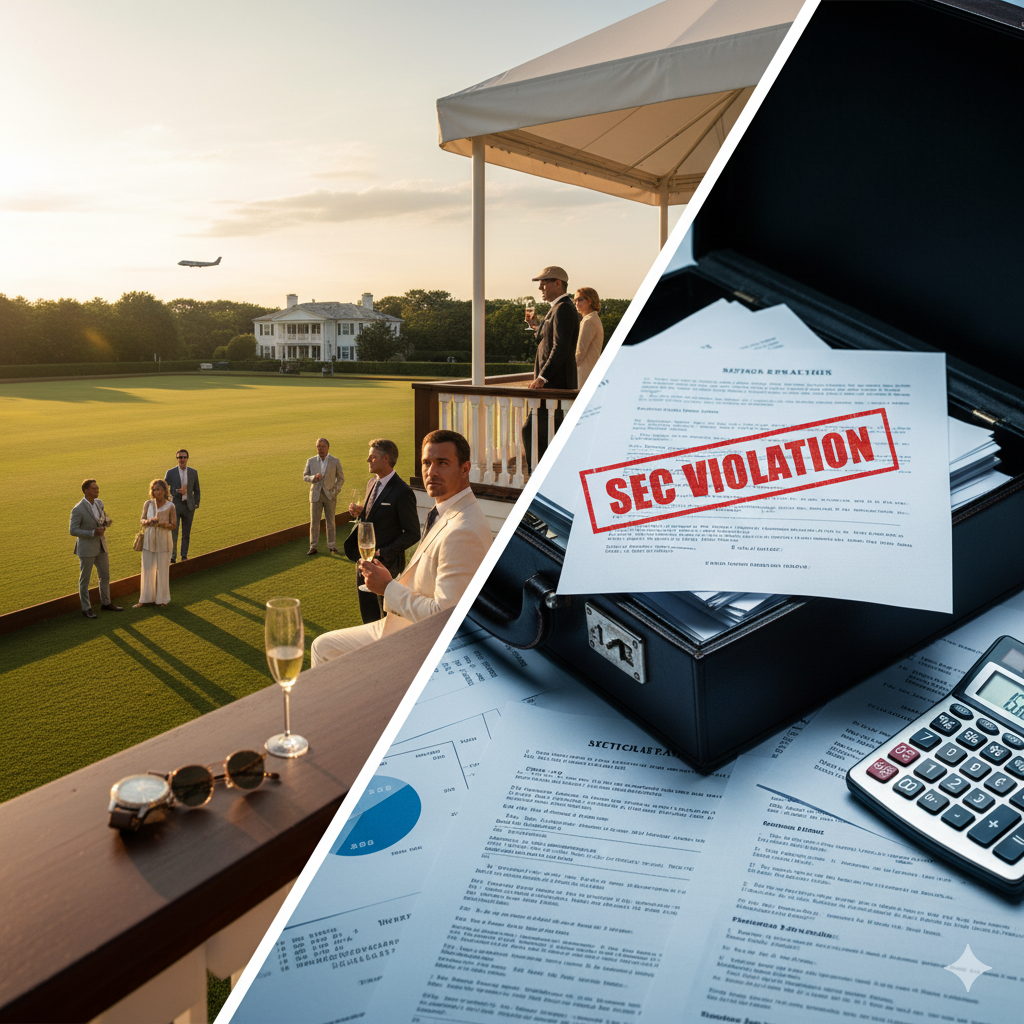The call came at 6 AM. A luxury watch brand’s general counsel, voice tight with panic, delivered news that would reshape their entire business strategy. The SEC had just slapped them with a $2.8 million fine for marketing violations targeting family offices. Moreover, they weren’t alone. Subsequently, nine other luxury brands received similar penalties in what regulators called an “ongoing sweep” of family office marketing compliance requirements.
The crime? Therefore, sending personalized investment presentations to ultra-wealthy family offices without understanding the regulatory minefield. Additionally, what seemed like sophisticated client development had triggered violations of the Investment Advisers Act. Consequently, marketing to family offices isn’t just about crafting the perfect pitch—it’s about navigating federal securities laws most luxury brands never knew existed.
The Regulatory Reality Most Brands Ignore
Family offices control over $6 trillion globally, making them the ultimate prize for luxury brands. However, the moment you start marketing investment-related services or products to these entities, you’ve entered SEC territory. Furthermore, the SEC’s family office rule creates a complex regulatory framework that most marketers completely misunderstand.
Which Industries Must Navigate Family Office Marketing Compliance Requirements
Not every luxury brand faces SEC scrutiny when marketing to family offices. Therefore, understanding which products and services trigger regulatory requirements becomes critical for strategic planning. Moreover, the distinction between regulated and unregulated marketing often determines whether your family office outreach becomes profitable or catastrophically expensive.
ALWAYS SUBJECT TO SEC REGULATIONS:
Investment advisors, wealth management firms, private equity funds, hedge funds, broker-dealers, financial planners, robo-advisors, and portfolio management services must comply with family office marketing compliance requirements. Additionally, any entity providing investment advice for compensation triggers immediate SEC oversight. Furthermore, fintech platforms offering investment products, cryptocurrency advisors, and alternative investment sponsors fall under strict regulatory frameworks.
OFTEN SUBJECT TO SEC REGULATIONS:
Real estate investment platforms marketing syndications or REITs to family offices require compliance. Moreover, art investment funds, wine investment services, collectibles-as-investments platforms, and fractional ownership programs trigger SEC scrutiny. Subsequently, luxury hospitality companies offering real estate investment opportunities or timeshare-like investment products must navigate regulatory requirements. Therefore, any business model combining luxury experiences with investment returns creates compliance obligations.
RARELY SUBJECT TO SEC REGULATIONS:
Pure luxury goods retailers, fashion houses, jewelry brands, yacht builders, private jet companies, and luxury hospitality services typically avoid SEC oversight. Additionally, art galleries selling directly-owned pieces, wine merchants selling bottles rather than investments, and luxury travel companies providing experiences without investment components operate outside regulatory scope. Furthermore, luxury lifestyle brands focusing on products rather than investment opportunities rarely trigger family office marketing compliance requirements.
THE DANGEROUS GRAY AREA:
However, luxury brands enter regulatory territory when they offer partnership opportunities promising returns, exclusive investment access, or revenue-sharing arrangements. Therefore, a luxury watch brand offering “investment-grade timepieces with guaranteed appreciation” suddenly requires SEC compliance. Moreover, hospitality companies marketing “profitable partnership opportunities” or real estate developers offering “exclusive investor access” trigger regulatory scrutiny regardless of their primary business model.
According to Katten Muchin Rosenman, luxury brands often trigger violations by treating family offices like any other high-net-worth prospect. Nevertheless, family office marketing compliance requirements demand a fundamentally different approach. Additionally, the stakes couldn’t be higher—violations typically cost more than the entire revenue generated from family office relationships.
The trap is deceptively simple. Therefore, when luxury brands offer investment-related products or advisory services to family offices, they may inadvertently become subject to Investment Advisers Act regulations. Consequently, this triggers registration requirements, fiduciary duties, and marketing restrictions that most brands never anticipated.
The $2.3 Million Violation Pattern
Recent SEC enforcement actions reveal a disturbing pattern. Additionally, marketing rule violations targeting family offices generate average legal fees and penalties of $2.3 million per incident. Moreover, these costs don’t include the reputational damage and lost business opportunities that follow regulatory scrutiny.
The most common violations include presenting hypothetical performance data without proper disclaimers. Furthermore, luxury brands often make unsubstantiated claims about exclusive access or guaranteed returns. Subsequently, even sophisticated marketing materials become SEC violations when they contain investment-related promises targeting family office decision-makers.
Consider the recent case where nine investment advisers paid $1.24 million in combined penalties for marketing rule violations. Therefore, the SEC’s Asset Management Unit specifically targeted firms for “untrue or unsubstantiated claims” in materials distributed to sophisticated investors. Consequently, family offices aren’t exempt from these protections—they’re often the primary focus of regulatory enforcement.
Understanding the Three-Strike Compliance Framework
Family office marketing compliance requirements operate on what Kirkland & Ellis calls a “three-strike framework.” Additionally, violations occur when brands fail to understand client classification, fiduciary obligations, and marketing restrictions.
First, client classification errors trigger immediate violations. Therefore, treating institutional family offices like retail customers subjects brands to Regulation Best Interest requirements. Moreover, this creates ongoing compliance obligations that most luxury marketers cannot fulfill. Consequently, even basic marketing communications become regulatory violations when improperly classified.
Second, fiduciary duty misunderstandings create massive liability exposure. Furthermore, the moment your marketing materials suggest advisory services, you may become legally obligated to act in the family office’s best interest. Subsequently, this creates conflicts with your business model that regulators aggressively prosecute.
Third, marketing restriction violations occur when brands advertise capabilities they cannot legally provide. Additionally, promising exclusive investment opportunities or guaranteed returns triggers SEC scrutiny regardless of client sophistication. Therefore, even family offices managing billions require the same marketing compliance protections as retail investors.
The Institutional Family Office Exemption Trap
Luxury brands often assume that sophisticated family offices receive different regulatory treatment. However, the institutional family office exemption creates more compliance obligations, not fewer. Moreover, qualifying for this exemption requires meeting specific criteria that most brands cannot verify.
To qualify as an institutional family office, entities must manage at least $50 million in assets. Additionally, they need experienced securities professionals who acknowledge independence from broker-dealers. Furthermore, these acknowledgments must be documented and maintained according to SEC requirements. Consequently, brands cannot simply assume family office sophistication without proper verification procedures.
The enforcement risk multiplies when brands market to family offices without understanding their regulatory status. Therefore, what appears to be sophisticated client development becomes securities law violations with criminal liability potential. Subsequently, the safest family office marketing strategy often involves avoiding direct marketing altogether.
Case Study: When Luxury Real Estate Events Become Securities Violations
Last summer’s enforcement action against a luxury real estate development company illustrates how family office marketing compliance requirements extend beyond traditional investment services. Additionally, the developer hosted exclusive polo events where family office principals received presentations about “exclusive investment opportunities” in Hamptons properties. Moreover, these presentations included projected rental yields and guaranteed appreciation rates that triggered SEC securities violations.
The critical mistake: marketing real estate as an investment product rather than selling properties directly. Therefore, the moment presentations included return projections and exclusive investor access, the real estate company became subject to investment advisor regulations. Furthermore, the polo event setting didn’t provide regulatory protection—social environments often create the most dangerous compliance exposures because marketing feels informal and unregulated.
Consider another recent case where a luxury art advisory firm received $180,000 in penalties for marketing “investment-grade art portfolios” to family offices. Subsequently, what began as art consulting services became securities violations when the firm promised specific returns and marketed art as alternative investments. Therefore, any business model that shifts from selling products to promising investment returns triggers family office marketing compliance requirements.
As documented in Social Life Magazine’s analysis of family office evolution, these entities now operate like sophisticated investment firms. Consequently, marketing to them requires the same compliance standards applied to institutional investors. Additionally, the informal atmosphere of luxury social events doesn’t provide regulatory protection.
The Compliance-First Marketing Strategy
Smart luxury brands build family office marketing compliance requirements into their strategy from day one. Therefore, successful approaches focus on relationship building rather than direct solicitation. Moreover, compliance-first strategies often generate better long-term results because they build trust through demonstrated regulatory competence.
The Five-Question SEC Compliance Test
Before marketing to any family office, luxury businesses should answer these critical questions to determine their regulatory exposure:
Question 1: Do you offer advice about securities, investments, or financial planning for compensation? Additionally, compensation includes not just direct fees but also revenue sharing, carried interest, or reimbursed expenses. Therefore, even indirect compensation triggers SEC oversight requirements.
Question 2: Do your marketing materials include performance projections, return guarantees, or investment-grade classifications? Furthermore, phrases like “investment opportunity,” “exclusive access,” or “guaranteed appreciation” automatically trigger securities regulations regardless of your primary business model.
Question 3: Do you manage client money, offer portfolio services, or provide custody of financial assets? Moreover, even temporary custody arrangements or escrow services can trigger regulatory requirements when serving sophisticated investors like family offices.
Question 4: Do you market partnership opportunities, revenue-sharing arrangements, or ownership stakes to family offices? Subsequently, these arrangements often constitute securities offerings that require SEC registration or exemption compliance.
Question 5: Do you hold yourself out as providing investment expertise, market insights, or advisory services beyond your core business? Therefore, a luxury real estate company that offers “investment advisory services” becomes subject to SEC regulations even if real estate sales remain their primary revenue source.
If you answer “yes” to any question, your business likely requires family office marketing compliance requirements. Additionally, legal consultation becomes mandatory rather than optional for any family office marketing initiatives.
The most effective approach involves content marketing that educates rather than solicits. Additionally, luxury brands should focus on brand awareness and relationship development without making investment-related claims. Furthermore, partnering with registered investment advisers provides regulatory cover while maintaining marketing effectiveness.
Professional service providers recommend establishing clear marketing compliance protocols before engaging any family office prospects. Therefore, legal review of all marketing materials becomes mandatory rather than optional. Subsequently, this upfront investment prevents much larger compliance costs and reputational damage. Moreover, as highlighted in Social Life Magazine’s experiential marketing analysis, sophisticated luxury marketing requires sophisticated compliance frameworks.
The Future of Regulated Luxury Marketing
Family office marketing compliance requirements will only become more stringent as regulatory scrutiny intensifies. Additionally, proposed legislation could require family offices managing over $750 million to register with the SEC. Furthermore, this would subject them to public disclosure requirements that fundamentally change luxury marketing dynamics.
Forward-thinking luxury brands are already adapting their strategies to anticipate increased regulation. Therefore, building compliance expertise now provides competitive advantages when regulations tighten. Moreover, brands with strong compliance frameworks will capture market share from competitors caught unprepared by regulatory changes.
The message for luxury marketers is clear: family office marketing compliance requirements aren’t optional considerations—they’re business survival imperatives. Additionally, the cost of non-compliance far exceeds the investment required for proper regulatory frameworks. Consequently, the smartest luxury brands treat compliance as a competitive advantage rather than a necessary burden.
Connect With Social Life Magazine
Ready to navigate the complex world of luxury marketing compliance? Social Life Magazine provides insider insights for sophisticated brands targeting ultra-wealthy audiences. Our platform connects luxury marketers with the regulatory expertise and market intelligence needed for successful family office engagement.


